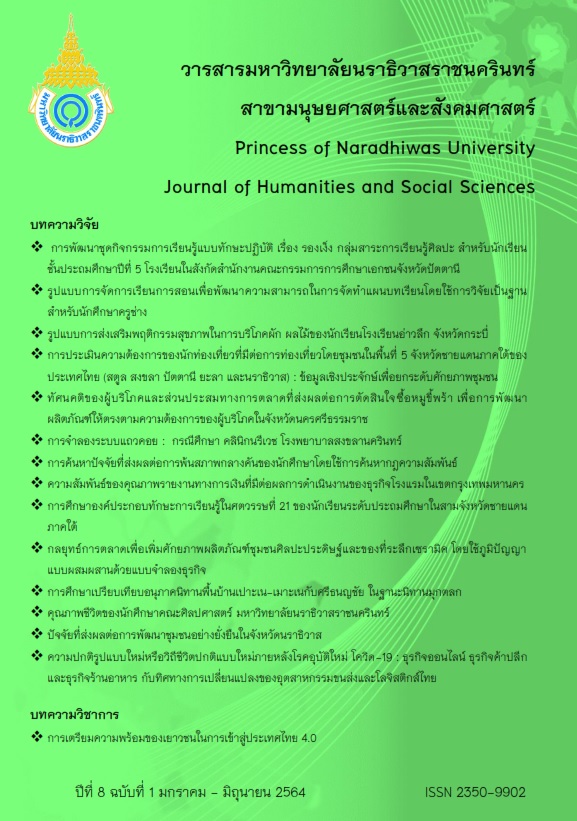Extracting Factors of Student's Drop-out using Association Rule Mining
Main Article Content
Abstract
The Faculty of Law, Surat Thani Rajabhat University faced with a number of student drop-out. The objective of this research aimed to extract factors associated with student drop-out using association rule mining. The experiment was conducted to examine the relationship among factors affecting overall drop-out rate. The in-depth analysis was done categorized by years of study (freshman, sophomore, junior and senior year). In addition, the experiment was examined according to the types of admission, personal factors, educational background, and academic performance in the university. The data were collected from 893 undergraduate law students who studied in the program from the academic year of 2012 to 2015.
The results showed that the students’ educational background was related to drop-out rate during the first and second year of their study. The students who had the average GPA in Mathematics and English at a fair level (1.00-1.99) from secondary school and GPAX at a medium level (between 2.00-2.99/4.00) showed relatively high drop-out rate. Freshman drop-out factor was associated with low annual income of their parents. The key factors that affected the drop-out of junior year and above were General Education courses; having poor result in Science for Quality of Life subject and having poor or fair result in Global Society and Living subject. In addition, the drop-out rate was caused from failing in specific requirement courses such as Principles of Private Law subject, and from receiving poor grades in Principles of Public Law subject and Thai Legal History subject. The findings can be used as a guideline to reduce drop-out rate, and this information can help board members in planning policy and strategy in the future to improve the quality of teaching and learning at the university.
Article Details

This work is licensed under a Creative Commons Attribution-NonCommercial-NoDerivatives 4.0 International License.
References
ซอและ เกปัน, พิมลพรรณ ลีลาภัทรพันธุ์, และอัจฉราพร ยกขุน. (2561). การวิเคราะห์ปัจจัยที่มีผล
ต่อการพ้นสภาพของนักศึกษาโดยใช้เทคนิคเหมืองข้อมูล กรณีศึกษา หลักสูตรวิทยาการ
คอมพิวเตอร์และหลักสูตรเทคโนโลยีสารสนเทศ มหาวิทยาลัยราชภัฏยะลา. Veridian
E-Journal, Science and Technology Silpakorn University, 5(4), 96-110.
บุษราภรณ์ มหัทธนชัย, ครรชิต มาลัยวงศ์, เสมอแข สมหอม, และณัฐิยา ตันตรานนท์. (2559).
กฎความสัมพันธ์ของรายวิชาที่มีผลต่อการพ้นสภาพนักศึกษาโดยใช้อัลกอรึทึมอพริโอริ.
ในการประชุมวิชาการระดับชาติ มหาวิทยาลัยราชภัฏกำแพงเพชร ครั้งที่ 3 (น.456-469).
กำแพงเพชร: มหาวิทยาลัยราชภัฏกำแพงเพชร.
เอกสิทธิ์ พัชรวงศ์ศักดา. (2557). การวิเคราะห์ข้อมูลด้วยเทคนิคดาต้า ไมน์นิง เบื้องต้น (พิมพ์ ครั้งที่ 2). กรุงเทพฯ: เอเชีย ดิจิตอลการพิมพ์.
เอกสิทธิ์ พัชรวงศ์ศักดา. (2558). Introduction to Business Analytics with RapidMiner studio 6.
กรุงเทพฯ: เอเชีย ดิจิตอลการพิมพ์.
Alkan, N. (2014). Humor, Loneliness and Acceptance: Predictors of University Drop-out Intentions.
Procedia-Social and Behavioral Sciences, 152, 1079-1086. Doi:10/1016/j.sbspro.2014 .09.278
Asif, R., Merceron, A., Ali, S. A., & Haider, N.G. (2017). Analyzing undergraduate students'
performance using educational data mining. Computers & Education, 133,
-194. doi:10.1016/j.compedu.2017.05.007
Burgos, C., Campanario, M. L., Peña D., Lara, J. A., Lizcano, D., & Martínez, M. A. (2018).
Data mining for modeling students’ performance: A tutoring action plan to prevent
academic dropout. Computers & Electrical Engineering, 66, 541-556. doi:
1016/j.compeleceng.2017.03.005
Chung, J. Y., & Lee, S. (2019). Dropout early warning systems for high school students using
machine learning. Children and Youth Services Review, 96, 346-353. doi:
1016/j.childyouth.2018.11.030
Han, J., Kamber, M., & Pei, J. (2011). Data Mining: Concepts and Techniques (3rded).
Morgan Kaufmann. Naltham, USA: Morgan Kaufmann.
Ryan, J. M.,Potier, T., Sherwin, A., & Cassidy, E. (2017). Identifying factors that predict
attrition among first year physiotherapy students: a retrospective analysis,
Physiotherapy Journal. doi: 10.1016/j.physio.2017.04.001
Shearer, C. (2000). The CRISP-DM model: The new blueprint for data mining. Journal of Data
Warehousing, 5(4), 13–22.


